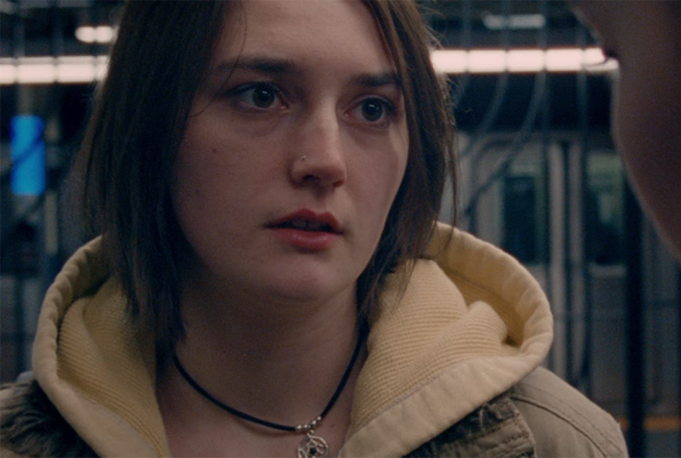You don’t know what you’ve been missing until it’s in front of you. This year was shaping up to be a historic year for movies made by women before the coronavirus pandemic shut down the theaters. It may still be one once the multiplexes open back up, but for now we’ll have to settle for films such as Never Rarely Sometimes Always on various streaming platforms. This great abortion drama comes to your TV or computer this Friday, and while it’s sad that you won’t be able to see it on the big screen like the crowds in New York and L.A. could (or like I did), the film remains vital viewing for its woman’s perspective on the story. That’s not the only thing it has going for it, but that is enough to imbue it with a power unlike any other movie’s, as well as make you wonder why we haven’t had this story before and what other films like it might be lying unmade right now.
The story sticks exclusively to its main character, Autumn Callahan (Sidney Flanigan), a 17-year-old high-school student who goes to the medical clinic near her hometown in Northumberland County, Pennsylvania, and discovers that she is 10 weeks pregnant. The doctor promptly shows her a hideous anti-abortion video, so that place is no further help. Not wanting her mom (Sharon van Etten) to find out about her pregnancy, Autumn instead confides in her cousin Skylar (Talia Ryder), who works alongside her in the local supermarket. Skylar steals some cash from the till — the store manager hits on her and Autumn in a gross and unsanitary way, so don’t feel bad — and the girls grab a bus to New York City, where Autumn can terminate her pregnancy without parental consent.
This is the work of Eliza Hittman, whose two previous films (one about an abusive relationship called It Felt Like Love and one about a gay prostitute called Beach Rats) showed flashes of great talent without ever quite coming to a dramatic point. This is a major step up, as Hittman avoids making any broad political points and instead focuses on the banal details of needing an abortion in a rural area, among which is having to travel the 170 or so miles to New York. Autumn initially tries to self-induce by taking a massive dose of vitamin C and punching herself in the stomach. Kids, I don’t recommend that you use these methods.
Much of the journey is conducted in silence, as the girls have already exhausted most conversation topics while living in a small town. When Autumn’s procedure is unexpectedly delayed by one and then two days, the girls have to find a place to spend the night, a challenge in any strange city and a particular one in New York. Their expenses outrun their cash supply, so Skylar goes off with a guy she just met (Théodore Pellerin) to see if she can borrow bus fare back home, and as Autumn watches them leave, neither she nor we know whether the young man can be trusted. It has been Hittman’s practice to work with novice actors, and Flanigan ranks as her best find so far.
This is particularly clear during a preliminary session in the Manhattan clinic, when she grows agitated at the abortion counselor’s question: “Your partner threatens or frightens you: never, rarely, sometimes, or always?” The subsequent questions reveal that Autumn’s situation is a good deal worse than we realize, and you might remember that her first line in the movie is from a song at a school talent show: “He makes me do things I don’t wanna do.” The camera sits opposite her in that examination room as she becomes more and more upset, and while there is something pitiless in Hittman’s gaze here, there’s something deeply compassionate, too. Sometimes, the best thing a filmmaker can do is not look away. After this comes another tremendous scene the night before Autumn’s procedure, when she kills time at a karaoke bar singing a stiff version of “Don’t Let the Sun Catch You Crying.” It’s rather an old song for a teenager to know, but it catches the mood perfectly.
At a time when Texas is trying to classify abortions as nonessential, Never Rarely Sometimes Always is a stark reminder that they are quite essential for some people, especially when they’re distant from the centers of political power. Yet this point would be less powerful if it weren’t wrapped up in such a magnificent coming-of-age story. Like so many before her, Autumn comes to New York as a child, learns to navigate the city, and leaves as something like an adult. As the movie ends with her drifting off to sleep on the bus back home, you sense that even without immediate prospects for the future, she’ll be all right.
Starring Sidney Flanigan and Talia Ryder. Written and directed by Eliza Hittman. Rated R.











